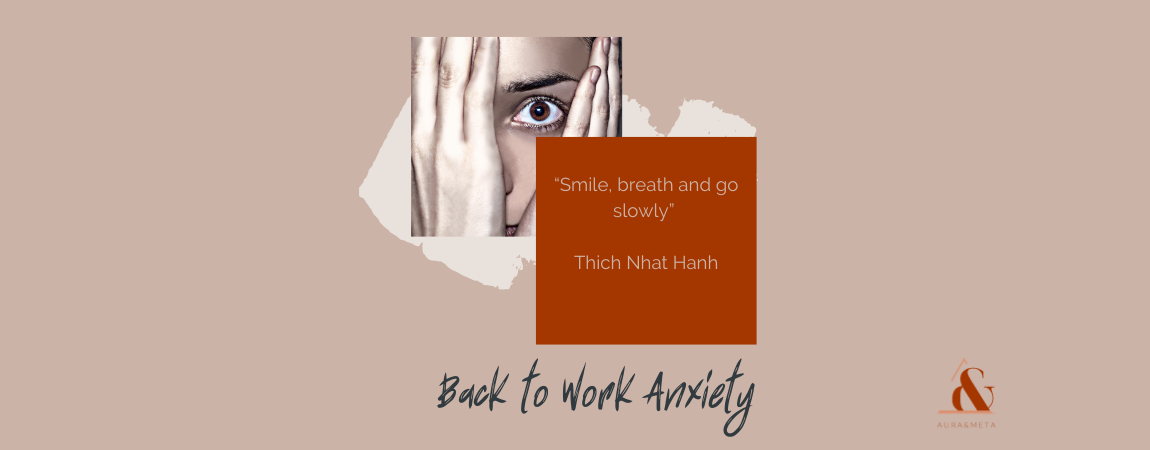In the context of a global pandemic and months of lockdown, summer holidays cancelled for many, going back to work may feel particularly heavier this year. Anxiety, which is traditionally part of the September Stress phenomenon, might be at a heightened state. Let’s take a look at its mechanism and what we can do to alleviate this all-too common weight on our chests.
How does anxiety work?
As things start to pick up again after a few months of summer lull. You may be going back to work hoping for clearer answers than when you set off on adjusted holiday plans. However, the lasting pandemic and economic backlash it is creating has maintained a cloud of uncertainty over what the future holds, both professionally and personally. This provides the perfect opportunity for a surge of stress-related conditions.
Amongst the most rampant conditions, anxiety is as insidious as it is likely to impact not just professional life but everything around it. We can identify the fears surrounding the continued situation of the Covid19 pandemic as the following:
-
- Fear of contracting the virus at work and transmitting it to family members.
- Fear of losing your job or work conditions changing (losing out on career progression or salary cuts).
- Fear of more global uncontrollable outcomes from a wider financial crisis to the loss of a loved one.
How to identify a state of anxiety
Caught in the everyday hustle and bustle, many of us do not necessarily take note of the symptoms of anxiety that may arise. Are you experiencing the following behaviours and feelings?
- Ruminating negative thoughts,
- Projecting fear in the future,
- Approaching an event or tasks at hand with a sense of dread,
- Finding it harder than usual to concentrate or being irritable,
- Physical manifestations such as shaking, dizziness, foggy brain or nausea. and impossibility to concentrate on the task at hand.
How helpful is a state of anxiety?
According to a 2016 study by neuroscientists at University College London, uncertainty (rather than a confirmed negative outcome) may very well be at the top of the list of stressors. This underlying stress can easily become a constant in our daily lives.
When put under prolonged stress, the body suppresses emotions to maintain homeostasis. Once it all gets too much, the stresses come out as manifestations in the body, mind and spirit. This can range from physical pain, hormone imbalance to insomnia, for example.
The previous months spent indoors and in a state of uncertainty may have caused a habit of ruminating negative situations to set in. While anxiety can act similarly to fear, by communicating and pushing us to avoid a threatening situation of danger, it also needs to be tuned down for us to lead a balanced life.
Helpful Habit: Ground down through your breathing
Last week, we talked about shifting your mindset by putting a positive spin on your thoughts to ultimately see setbacks as opportunities for growth. In the same way, you have the ability to defeat anxiety, by adopting a counterintuitive solution: giving yourself space and time. Yes, you are facing a never-ending to-do list, but sometimes slowing down helps speed up the process once you’ve reached the right mindset (ie. a growth mindset).
It is easy to get caught up in disaster scenarios, what ifs and future projections based on past negative experiences or trauma. Learning to reconnect with the present will give you the much-needed perspective to strive forward. Breathing exercises enable us to access an awareness of our body and its present state. It is scientifically proven that conscious breathing activates the parasympathetic nervous system, which saves energy by slowing down the heart rate, inducing a state of rest. A simple tool like exploring breathing patterns contributes to body relaxation, particularly deeper ones we cannot access like our sphincter muscles housed in our gastrointestinal tract.
Here is how to practice conscious breathing:
- Even though you can practice this anywhere, it is best to find a place where you will not be interrupted.
- Stand, sit or lie comfortably and begin to take note of your breathing. Is it shallow? Fast-paced? Chaotic?
- Start to heavenly breath in and out, counting to 4, expiring with pursed lips.
- Notice the sensations created by the air flowing through your body.
If this topic resonates with you and you’d like to discuss this further, you can have a virtual herbal tea with Sandra by clicking here.

